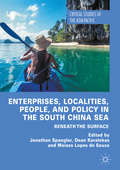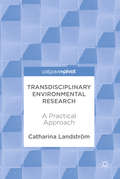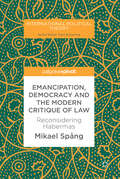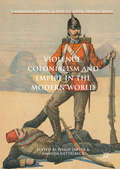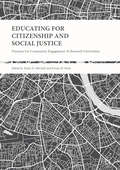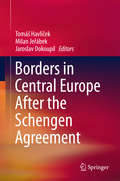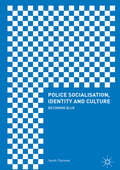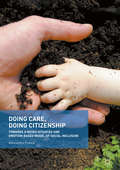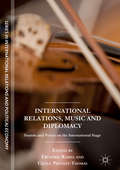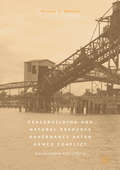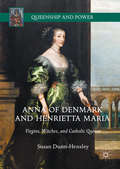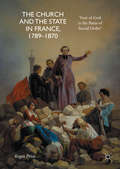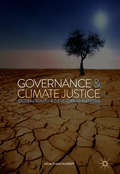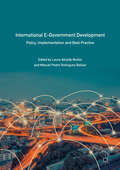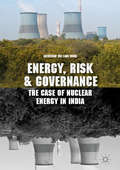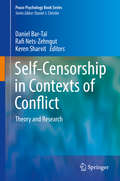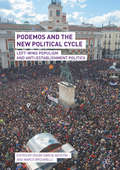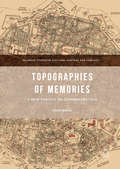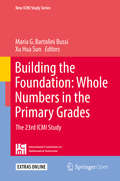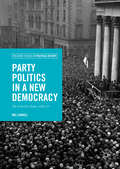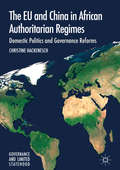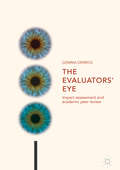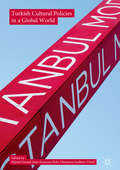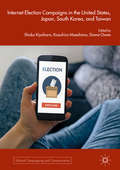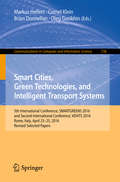- Table View
- List View
Enterprises, Localities, People, and Policy in the South China Sea
by Jonathan Spangler Dean Karalekas Moises Lopes de SouzaThis volume takes readers beneath the surface of the South China Sea by exploring critical but under-researched issues related to the maritime territorial disputes. It draws attention to the importance of private sector, civil society, and subnational actors' roles in the disputes and sheds light on key policy issues that are addressed less often in the literature. By going beyond mainstream analyses focused solely on issues of traditional security, resource economics, and international law, it offers a fresh and engaging look at the South China Sea disputes. The book is divided into five parts - historical foundations, enterprises, localities, people, and policy - and its chapters investigate historiography in the region, the global defense industry's role as beneficiary of the disputes, tourism as a territorial strategy, the roles of provinces and local governments, disaster management, confidence-building measures, environmental and science diplomacy, and other topics seldom discussed in other analyses of the South China Sea disputes. The book's diverse content and fresh perspectives make it an essential read not only for policymakers and those in the international relations community but also for all others interested in gaining a more well-rounded understanding of the many issues at stake in the South China Sea maritime territorial disputes.
Transdisciplinary Environmental Research: A Practical Approach
by Catharina LandströmThis book explores the practice of transdisciplinary research through the narratives of different individuals taking part in a project investigating local water management. The research project ran for one year and brought seven university scientists together with seven local residents to explore relationships between water quantity, water quality, abstraction of water resources and how to reduce pollution.Landström presents three conversations that convey the experience of transdisciplinary practice in natural language in order to offer insights into the workings of a transdisciplinary Environmental Competency Group. The conversations highlight Environmental Competency Groups as tools enabling collaboration between knowledgeable individuals who do not share a common scientific vocabulary.Transdisciplinary Environmental Research will appeal to natural and social scientists interested in working collaboratively with each other and the general public on environmental research projects.
Emancipation, Democracy and the Modern Critique of Law: Reconsidering Habermas (International Political Theory)
by Mikael SpångThis book focuses on Jürgen Habermas’ theorising on law, rights and democracy in light of the modern critique of law. The latter tradition, which goes back to Hegel and Marx, has addressed the limitations of rights as vocabulary of emancipation and law as language of autonomy. Since Habermas claims that his reconstruction of private and public autonomy has an emancipatory aim, the author has chosen to discuss it in the context of the modern critique of law. More specifically, the study addresses the need to consider the dialectic of law, in which law is both a condition for emancipation and domination, when discussing what law and rights permit. It will appeal to students and scholars across the fields of political theory, law and legal criticism, as well as sociology and sociology of law.
Violence, Colonialism and Empire in the Modern World
by Philip Dwyer Amanda NettelbeckThis book explores the theme of violence, repression and atrocity in imperial and colonial empires, as well as its representations and memories, from the late eighteenth through to the twentieth century. It examines the wide variety of violent means by which colonies and empire were maintained in the modern era, the politics of repression and the violent structures inherent in empire. Bringing together scholars from around the world, the book includes chapters on British, French, Dutch, Italian and Japanese colonies and conquests. It considers multiple experiences of colonial violence, ranging from political dispute to the non-lethal violence of everyday colonialism and the symbolic repression inherent in colonial practices and hierarchies. These comparative case studies show how violence was used to assert and maintain control in the colonies, contesting the long held view that the colonial project was of benefit to colonised peoples.
Educating for Citizenship and Social Justice
by Krista M. Soria Tania D. MitchellIn this edited volume, authors explore the ways in which departments, programs, and centers at public research universities are working to better engage students in the work of citizenship and social justice. The chapters in this book illuminate the possibilities and challenges for developing community engagement experiences and provide evidence of the effects of these efforts on communities and undergraduate students' development of citizenship outcomes. This text reveals how important the integration of our intentions and actions are to create a community engaged practice aimed towards justice.
Borders in Central Europe After the Schengen Agreement
by Tomáš Havlíček Milan Jeřábek Jaroslav DokoupilThis book is the result of research into the considerable impacts the signing of the Schengen Agreement has had on the border regions of the signatory, in particular the Central European internal borders. The analysis provides an in-depth look at European integration, development and perception at the state level as well as in the selected border regions of Central Europe. The book discusses results from population questionnaires in this region, and presents the most important features of development of border regions within Central European internal borders/borderlands after the Schengen Agreement. This book is suitable for students and researchers dealing with the borderlands, but also outlines sufficient information to be of interest to regional planners and policy makers.
Police Socialisation, Identity and Culture
by Sarah CharmanThis book reinvigorates the debate about the origins and development of police culture within our changing social, economic and political landscape. An in-depth analysis and appreciation of the police socialisation, identity and culture literature is combined with a comprehensive four-year longitudinal study of new recruits to a police force in England. The result offers new insights into the development of, and influences upon, new police recruits who refer to themselves as a "new breed" of police officer. Adding significantly to the police culture literature, this original and empirically based research also provides valuable insights into the challenges of modern policing in an age of austerity. Scholars of policing and criminal justice, as well as police officers themselves will find this compelling reading.
Doing Care, Doing Citizenship
by Alessandro PratesiThis book examines the emotional, micro-situated dynamics of status inclusion/exclusion that people produce while caring for others by focusing, in particular, on non-conventional families. Grounded in empirical research that involves different types of care and family contexts, the book situates care within more inclusive and critical approaches while shedding light on its multiple and often overlooked meanings and implications. Engaging and accompanied by a useful methodological appendix, Doing Care, Doing Citizenship is essential reading for students and academics of sociology, psychology, social work and social theory. It will also be of interest to practitioners interested in developing their understanding of the relationship between care, emotions, social inclusion and citizenship.
International Relations, Music and Diplomacy
by Frédéric Ramel Cécile Prévost-ThomasThis volume explores the interrelation of international relations, music, and diplomacy from a multidisciplinary perspective. Throughout history, diplomats have gathered for musical events, and musicians have served as national representatives. Whatever political unit is under consideration (city-states, empires, nation-states), music has proven to be a component of diplomacy, its ceremonies, and its strategies. Following the recent acoustic turn in IR theory, the authors explore the notion of “musical diplomacies” and ask whether and how it differs from other types of cultural diplomacy. Accordingly, sounds and voices are dealt with in acoustic terms but are not restricted to music per se, also taking into consideration the voices (speech) of musicians in the international arena.Read an interview with the editors here: https://www.sciencespo.fr/ceri/en/content/international-relations-music-and-diplomacy-sounds-and-voices-international-stage
Peacebuilding and Natural Resource Governance After Armed Conflict: Sierra Leone and Liberia
by Michael D. BeeversThis book argues that a set of persuasive narratives about the links between natural resource, armed conflict and peacebuilding have strongly influenced the natural resource interventions pursued by international peacebuilders. The author shows how international peacebuilders active in Liberia and Sierra Leone pursued a collective strategy to transform “conflict resources” into “peace resources” vis-à-vis a policy agenda that promoted “securitization” and “marketization” of natural resources. However, the exclusive focus on securitization and marketization have been counterproductive for peacebuilding since these interventions render invisible issues connected to land ownership, environmental protection and sustainable livelihoods and mirror pre-war governing arrangements in which corruption, exclusion and exploitation took root. Natural resource governance and peacebuilding must go beyond narrow debates about securitization and marketization, and instead be a catalyst for trust–building and cooperation that has a local focus, and pursues an inclusive agenda that not only serves the cause of peace, but the cause of people.
Anna of Denmark and Henrietta Maria: Virgins, Witches, and Catholic Queens (Queenship and Power)
by Susan Dunn-HensleyThis book examines how early Stuart queens navigated their roles as political players and artistic patrons in a culture deeply conflicted about the legitimacy of female authority. Anna of Denmark and Henrietta Maria both employed powerful female archetypes such as Amazons and the Virgin Mary in court performances. Susan Dunn-Hensley analyzes how darker images of usurping, contaminating women, epitomized by the witch, often merged with these celebratory depictions. By tracing these competing representations through the Jacobean and Caroline periods, Dunn-Hensley peels back layers of misogyny from historical scholarship and points to rich new lines of inquiry. Few have written about Anna's religious beliefs, and comparing her Catholicism with Henrietta Maria's illuminates the ways in which both women were politically subversive. This book offers an important corrective to centuries of negative representation, and contributes to a fuller understanding of the role of queenship in the English Civil War and the fall of the Stuart monarchy.
The Church and the State in France, 1789-1870
by Roger PriceThis book explores the responses of the Roman Catholic Church to the French Revolution beginning in 1789, to the liberal revolution in 1830, and particularly the democratic revolution of 1848 in France, and asks how these events were perceived and explained. Informed by the collective memory of the first revolution, how did the Church react to renewed 'catastrophe'? How did it seek to influence political choice? Why did authoritarian government prove to be so attractive? This is a study of the impact of religion on political behaviour, as well as of the politicisation of religion. Roger Price employs the methodology of the social and cultural historian to explain the development and interaction of two key institutions, Church and State, during a period of political and social upheaval. Drawing on a wide range of archival and printed primary sources, as well as secondary literature, this book analyses the diverse perceptions of people with power and the impact of their decisions, and the responses, of a wide range of individuals and communities.
Governance & Climate Justice: Global South & Developing Nations (Politics, Economics, And Inclusive Development Ser.)
by Julia PuaschunderThis book examines international climate change mitigation and adaptation regimes with the aim of proposing fair climate stability implementation strategies. Based on the current endeavors to finance climate change mitigation and adaptation around the world, the author introduces a 3-dimensional climate justice approach to share the benefits and burdens of climate change equitably within society, across the globe and over time.
International E-Government Development
by Manuel Pedro Rodríguez Bolívar Laura Alcaide MuñozThis book provides an examination of e-Government frameworks and maturity stages in governments around the world, including an overview of the legal frameworks that have supported them. Divided into three sections, the first part of this book analyses the theoretical context of current policies, codes of best practice and their implementation. The second section presents case studies which bring key issues to the fore including open government, privacy protection, social media, democracy, systems failures, innovations in inter-organizational e-government projects, and open data systems. The authors demonstrate the importance of the successful implementation of e-Government for improving managerial efficiency, public service delivery and citizen engagement, with special attention given to developing countries. The book concludes by drawing out the lessons learned from the latest research and recommending solutions for improving the implementation of e-Government in the future, thereby helping to achieve more transparent, participative and democratic societies. This book will provide an invaluable resource for researchers, policy-makers, public managers, international organizations and technical experts.
Energy, Risk and Governance
by Catherine Mei Ling WongThis book is about how energy, risk and governance are intertwined in the development of the nuclear industry in India and its relationship with the Indian public. It provides a rare insider-view of how the nuclear establishment thinks about risk, contrasted with public understandings of nuclear risk. Energy, Risk and Governance presents a nuanced picture of why nuclear energy is still considered by some as a rational choice. This is in spite of its risks, the ambiguities in both expert and public risk perceptions, and the internal reflexivities that have emerged within the nuclear establishment as a result of the Fukushima-Daiichi disaster that is absent from public discourse. The insights in this book are not unique to India and similar observations can likely be made across the global nuclear industry. Reflecting on what this means for risk governance in practice, this book proposes practical suggestions and some tools that practitioners in the nuclear industry can use in public engagement, risk communication and deliberation at various stages of decision-making.
Self-Censorship in Contexts of Conflict
by Daniel Bar-Tal Keren Sharvit Rafi Nets-ZehngutThis groundbreaking volume explores the concept of self-censorship as it relates to individuals and societies and functions as a barrier to peace. Defining self-censorship as the act of intentionally and voluntarily withholding information from others in the absence of formal obstacles, the volumes introduces self-censorship as one of the socio-psychological mechanisms that prevent the free flow of information and thus obstruct proper functioning of democratic societies. Moreover it analyzes this socio-psychological phenomenon specifically in the context of intractable conflict, providing much evidence from the Israeli-Palestinian conflict. Moving from the micro to the macro level, the collected chapters put the individual as the focal unit of psychological analysis while embedding the individual in multiple levels of context including families, organizations, and societies. Following a firm conceptual explanation of self-censorship, a selection of both emerging and prominent scholars describe the ways in which self-censorship factors into families, organizations, education, academia, and other settings. Further chapters discuss self-censorship in military contexts, narratives of political violence, and the media. Finally, the volume concludes by looking at the ways in which harmful self-censorship in societies can be overcome, and explores the future of self-censorship research. In doing so, this volume solidifies self-censorship as an important phenomenon of social behavior with major individual and collective consequences, while stimulating exciting and significant new research possibilities in the social and behavioral sciences. Conceptually carving out a new area in peace psychology, Self Censorship in Contexts of Peace and Conflict will appeal to psychologists, sociologists, peace researchers, political scientists, practitioners, and all those with a wish to understand the personal and societal functioning of individuals in the real world.
Podemos and the New Political Cycle
by Óscar García Agustín Marco BriziarelliThis edited volume explores the context in which the Spanish party Podemos operates as both an agent and product of political cycles. It provides an account of the party's genealogy, ideological environment and relation to other political initiatives in Latin America and Western Europe. The contributors address the multiples dynamics generated by Podemos as a new party developed out of the economic crisis, the structural crisis concerning social democracy and the incarnation of the welfare state project, and, more generally, out of the Left. It will appeal to upper-level students and scholars interested in Spanish politics, history, culture and sociology.
Topographies of Memories
by Anita BakshiThis book explores new approaches towards developing memorial and heritage sites, moving beyond the critique of existing practices that have been the traditional focus of studies of commemoration. Offering understandings of the effects of conflict on memories of place, as manifested in everyday lives and official histories, it explores the formation of urban identities and constructed images of the city. Topographies of Memories suggests interdisciplinary approaches for creating commemorative sites with shared stakes. The first part of the book focuses on memory dynamics, the second on Nicosia, the divided capital of Cyprus, and the third on physical and material world interventions. Design practices and modes of engagement with places of memory are explored, making connections between theoretical explorations of memory and forgetting and practical strategies for designers and practitioners.
Building the Foundation: The 23rd ICMI Study (New ICMI Study Series)
by Maria G. Bartolini Bussi Xu Hua SunThis twenty-third ICMI Study addresses for the first time mathematics teaching and learning in the primary school (and pre-school) setting, while also taking international perspectives, socio-cultural diversity and institutional constraints into account. One of the main challenges of designing the first ICMI primary school study of this kind is the complex nature of mathematics at the early level. Accordingly, a focus area that is central to the discussion was chosen, together with a number of related questions. The broad area of Whole Number Arithmetic (WNA), including operations and relations and arithmetic word problems, forms the core content of all primary mathematics curricula. The study of this core content area is often regarded as foundational for later mathematics learning. However, the principles and main goals of instruction on the foundational concepts and skills in WNA are far from universally agreed upon, and practice varies substantially from country to country. As such, this study presents a meta-level analysis and synthesis of what is currently known about WNA, providing a useful base from which to gauge gaps and shortcomings, as well as an opportunity to learn from the practices of different countries and contexts.
Party Politics in a New Democracy
by Mel FarrellThis book offers a timely, and fresh historical perspective on the politics of independent Ireland. Interwar Ireland's politics have been caricatured as an anomaly, with the distinction between Fianna F#65533;il and Fine Gael bewildering political commentators and scholars alike. It is common for Ireland's politics to be presented as an anomaly that compare unfavourably to the neat left/right cleavages evident in Britain and much of Europe. By offering an historical re-appraisal of the Irish Free State's politics, anchored in the wider context of inter-war Europe, Mel Farrell argues that the Irish party system is not unique in having two dominant parties capable of adapting to changing circumstances, and suggests that this has been a key strength of Irish democracy. Moreover, the book challenges the tired clich#65533; of 'Civil War Politics' by demonstrating that events subsequent to Civil War led the Fine Gael/Fianna F#65533;il cleavage dominant in the twentieth-century.
The EU and China in African Authoritarian Regimes: Domestic Politics And Governance Reforms (Governance And Limited Statehood Ser.)
by Christine HackeneschThis open access book analyses the domestic politics of African dominant party regimes, most notably African governments’ survival strategies, to explain their variance of opinions and responses towards the reforming policies of the EU. The author discredits the widespread assumption that the growing presence of China in Africa has made the EU’s task of supporting governance reforms difficult, positing that the EU’s good governance strategies resonate better with the survival strategies of governments in some dominant party regimes more so than others, regardless of Chinese involvement. Hackenesch studies three African nations – Angola, Ethiopia and Rwanda – which all began engaging with the EU on governance reforms in the early 2000s. She argues that other factors generally identified in the literature, such as the EU good governance strategies or economic dependence of the target country on the EU, have set additional incentives for African governments to not engage on governance reforms.
The Evaluators’ Eye
by Gemma DerrickThis book offers an empirical analysis of how academic peer review panels mediate the traditionally non-academic criterion of societal impact. The UK’s 2014 Research Excellence Framework (REF2014) for the first time included an “Impact” criterion that considered how research had influenced society, beyond academia. Using a series of interviews with REF2014 Main Panel A evaluators, the book explores how a dominant definition of Impact was constructed within panels and how this led to the development of strategies around valuing it as an ambiguous object. By doing so, Derrick brings a unique perspective to Impact that is currently overlooked in the dominant Impact evaluation discourse. Through examining the evaluation procedure as a dynamic process it is argued that the best models, strategies and insights for Impact evaluation are those constructed in practice, within peer review groups. By exploring the legitimacy of peer review as a tool to assess the societal impact of research, Derrick states that the future for Impact evaluation is not to seek alternative tools where peer review seemingly fails, but instead to highlight ways in which peer review panels can work smarter. The book will be essential reading for students, academics and policy-makers working in Education, as well as researchers interested in peer review processes and the research evaluation frameworks and audit exercises globally.
Turkish Cultural Policies in a Global World
by Muriel Girard Jean-François Polo Clémence Scalbert-YücelThis book provides a multidisciplinary analysis of the production of Turkish cultural policies in the context of globalization and of the circulation of knowledge and practices. Focusing on circulations, the book proposes an innovative approach to the transfer of cultural policies, considering them in terms of co-production and synchrony. This argument is developed through an examination of circulations at the international, national, and local levels; employing original empirical data and case study analyses. Divided into three parts the book first examines the Kemalist legacy, before turning to the cultural policies developed under the AKP's leadership, and concludes by investigating the production of cultural policies in the outlying regions of Turkey. The authors shed new light on the particular importance of culture to the understanding of the societal upheavals in contemporary Turkey. By considering exchanges as circulations rather than one-way impositions, this book also advances our understanding of how territories are (re)defined by culture and makes a significant contribution to the interrogation of the concept of "Westernization". This book brings into clear focus the reconfigurations currently taking place in Turkish cultural policy, demonstrating that while they are driven by the ruling party, they are also the work of civil society actors. It convincingly argues that an authoritarian turn need not necessarily spell the end of the cultural scene, and highlights the innovative adaptations and resistance strategies used in this context. This book will appeal to students and scholars of public policy, sociology and cultural studies.
Internet Election Campaigns in the United States, Japan, South Korea, and Taiwan
by Diana Owen Shoko Kiyohara Kazuhiro MaeshimaThis book investigates how institutional differences, such as the roles of political parties and the regulation of electoral systems, affect the development of Internet election campaigns in the U. S. , Japan, Korea, and Taiwan. It examines whether or not the "Americanization of elections" is evident in East Asian democracies. While Japan is a parliamentary system, the U. S. and Korea are presidential systems and Taiwan is a semi-presidential system that has a president along with a parliamentary system. Furthermore, the role of the presidency in the U. S. , Korea, and Taiwan is quite different. Taking these variations in political systems into consideration, the authors discuss how the electoral systems are regulated in relation to issues such as paid advertisements and campaign periods. They argue that stronger regulation of election systems and shorter election periods in Japan characterize Japanese uniqueness compared with the U. S. , Korea, and Taiwan in terms of Internet election campaigns.
Smart Cities, Green Technologies, and Intelligent Transport Systems
by Markus Helfert Brian Donnellan Cornel Klein Oleg GusikhinThis book constitutes the thoroughly refereedproceedings of the 4th International Conference on Smart Cities and Green ICTSystems, SMARTGREENS 2015, and the 1st InternationalConference on Vehicle Technology and Intelligent Transport Systems, VEHITS2015, held in Lisbon, Portugal, in May 2015. The 15 full papers of SMARTGREENS 2015 presentedwere carefully reviewed and selected from 73 submissions. VEHITS 2015 received27 paper submissions from which 3 papers were selected and published in thisbook. The papers reflect topics such as smart cities, energy-aware systems andtechnologies, sustainable computing and communications, sustainabletransportation and smart mobility.
